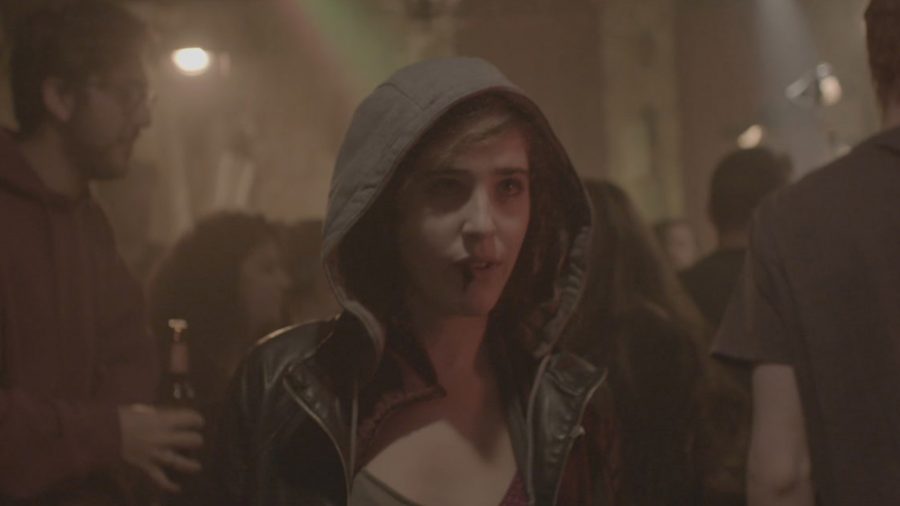Tribeca 2017: Missed Connections and Severed Links
Avigail Harari as Gili in “Big Sister,” which was a part of the Tribeca Film Festival short film series “Disconnected” that premiered last Friday.
April 24, 2017
Tribeca Film Festival’s short film series “Disconnected” premiered last Friday, featuring six films that each explored the titular theme in their own unique way. Directors interpreted the theme with plots revolving around everything from taxi rides and suitcases. With such a broad but relatable topic to work with, nearly every film packed a punch of sentimentality. Check out highlights from the series below.
“Wave”
Benjamin Cleary and TJ O’Grady-Peyton’s project follows Gaspar Rubicon (O’Grady-Peyton), who wakes up from a coma five years after a traumatic car accident unable to speak or understand a word of English. Instead, Rubicon speaks a language that appears to be entirely his own. Eventually, he figures out a rudimentary method of communication using magazine clippings and gestures. Rubicon’s loneliness is crushing — he is unable to manage simple things like reading menus at restaurants or understanding music lyrics.
Concise narration presents Rubicon’s backstory as the unfortunate man floats in a nebulous space of what could be an inner eye or some other technicolor sea of conceptual isolation. The story is quick, with abrupt cuts and jerking action. Ever-present are Rubicon’s headphones and lollipops. Missing are other humans, dialogue and eye contact.
The film becomes not just curiously comical but beautifully touching as Rubicon shares his story on YouTube, hoping to find a single soul that can understand him. As he first experiences crushing mockery followed by tear-jerking support, a less-than-subtle commentary on empathy within communication emerges. The film’s moral is explicit, but perhaps this unambiguity is better — goodness knows a little more understanding wouldn’t hurt us.
“Big City”
Vijay (Gurvinder Singh Atwal) is a solitary Sikh working as a taxi driver in Melbourne, Australia. He picks up the grinning drunk Chris (CJ Fortuna) during one late night working in the city. After a long drive to Chris’ home far from the city, Vijay finds a companion in a man he never expected to meet, warming the hearts of the audience. Chris defends Vijay from belligerent racists at a gas station, buys his new vegetarian friend a falafel and even shares a tender moment with Vijay while sitting on the hood of the car atop a hill that overlooks the city skyline.
The relative silence of the film grows less and less uncomfortable and becomes suddenly heartbreaking as the tale reaches its end. A small gasp and a resigned drop of Vijay’s shoulders are all that the audience is left with — this, and the raw ache of injustice.
“Big Sister”
In a “The Girl With the Dragon Tattoo”-esque plot, Gili (Avigail Harari) cruises around Israel’s streets at night, crusading against sexual offenders with a smirk and several well placed kicks. Her world is shaken, though, when she learns that her younger brother (Roe Golan) has raped his high-school classmate.
Israeli director Michal Gassner created “Big Sister” as her graduation project for The Jerusalem Sam Spiegel Film School. It has a scope and impact beyond that of filmmakers three times as experienced as Gassner — likely because in a male-dominated industry, stories that explore the complexity of unpacking the ingrained culture of male sexual dominance are few and far between. The story is crucially complex and still unflinching.
“Life Boat”
“Life Boat” boasts impeccable acting, a simple scene setting and plot structure and a script that is just short and concise enough to get its point across with a punch.
Six teens sit in a circle on their first day of inpatient therapy for conditions ranging from suicide attempts to substance abuse. Three boys, three girls and the lone guidance counselor take their first steps toward recovery.
The counselor (Stephen Dorff), a survivor of his own suicide attempt, forces his students to play a game called “life boat.” Students must pick three amongst themselves to survive a massive plane crash on a life raft. The students may pick themselves as one survivor, and are forced within mere minutes of meeting each other to choose who hypothetically lives and dies. It takes no time for the counselor to verbally abuse one girl into leaving after calling her “worse than a whore,” choke another until she admits under duress that her attempt at suicide was just a way to get attention from her parents and force the five remaining students to physically fight for their metaphorical right to live.
The whole project could either be a critique of counselors and therapists who choose their professions in vain hopes of adding meaning to a life they fear is empty or an attempt at a brutal awakening to the so-called reality of life, forcing addicts and depressed people to admit to their own desire to survive. It’s hard to tell — either way, it felt like being forced to watch someone kick a puppy who had barked a bit too loudly.
“The Suitcase”
New Yorkers — and anyone old enough to be affected by the tragedy of 9/11 or remember it with any sort of emotional clarity — can appreciate the simplest and most rewarding film to address the event yet. “The Suitcase” dramatizes the true account of a Boston-bred baggage handler at Logan International Airport who — while illegally rifling through a passenger’s suitcase — discovers a bag belonging to one of the 9/11 terrorists. The possessions and documents discovered inside are those that allowed the FBI and the Pentagon to identify the hijackers’ names and motives, a discovery which undoubtedly saved further lives.
The film could have easily veered into nationalistic sentimentality, but instead tells the tale of a simple hero. Director Abi Corben deserves credit for transforming what could have been seen as propaganda or highly tenuous criticism into the story of a man who dreams as many dreams as he makes mistakes.
Email Hailey Nuthals at [email protected].
























































































































































